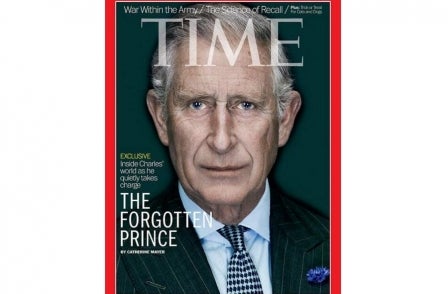
A journalist and author has told how her Time magazine cover story featuring an interview with Prince Charles was screened by his representatives.
Catherine Mayer, who is editor-at-large of Time, was also subject to the same process when writing her book, published earlier this year, Charles: Heart of a King.
Mayer published the terms and conditions agreed with Clarence House – which also impacted on interviews with other people who know the prince – in the book because, she said, it was her “journalistic duty”.
However, in February the book drew criticism from Clarence House. The prince's communications secretary Kristina Kyriacou told the Evening Standard “the author did not have the access she claimed”, and his principal private secretary William Nye wrote to The Times to dispel "ill-informed speculation recently, in your columns and elsewhere, about the attitude of the Prince of Wales to the role of sovereign".
Mayer described the process on Radio 4’s Media Show, which was following up on a Prince Charles interview contract that Channel 4 News refused to sign. The Independent reported that Sky News and other broadcasters have agreed to sign similar contracts.
Asked about her Prince Charles book, Mayer said: “There was a two-part process. It started as a Time magazine cover story and then became a book. So there were two separate sets of agreement.
"For the Time story they gave me special access, I got to have a sit-down with him, but they didn't like me to use the word 'interview' – that was to be billed as a 'conversation' rather than an interview.
"It was recorded and I asked a question and he answered it, and then I asked a question and he answered it – ‘but we'll call it a conversation’."
Media Show host Steve Hewlett asked whether Clarence House had subsequent control of what she did with the recordings.
Mayer responded: "There was no big contract that I signed, but there was a clear series of understandings and there was a big negotiation, there was a constant process of negotiation, where I was able to do that but I had to then show them the transcript and they then decided that various things that he'd said they did not want used."
Asked if she did not use them, Mayer said: "No. And I also for that got other kinds of special access, including attending a private dinner with him and that kind of thing.
"For the book it was even more – I mean, there were many, many supplementary interviews. Now many of the supplementary interviews were ones that I got myself and where Clarence House didn't know about them, and some of those were on the record and a lot of those were off the record.
"But Clarence House also facilitated a great many interviews people that he knew, so I would go to them but they'd say: 'Yes, we need to check with Clarence House,' they'd say yes.
“Those interviews, many of them, were subject to the same kinds of restrictions, which is why I felt it journalistically, absolutely important to detail all of this in my book… I published the conditions."
Stewart Purvis, the former chief executive of ITN, which produces Channel 4 News, said he had signed a contract giving Clarence House full editorial control of a programme in 1986. But he said he was “astonished” broadcasters still sign them.
Also on the programme was the Evening Standard’s royal correspondent Robert Jobson, who said he was not “overly surprised” by the contents of the contract, reported in The Independent.
"I think they're just being a bit careful,” he said. "I don't think it's anything new… it's been going on for years."
Jobson also told how he, when working for the News of the World, allowed Prince Andrew to "check the quotes were correct" from an interview.
Email pged@pressgazette.co.uk to point out mistakes, provide story tips or send in a letter for publication on our "Letters Page" blog
